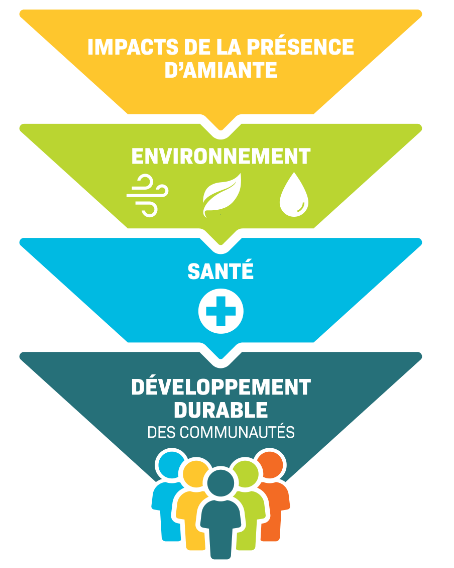Création, mandat, valeurs
CRÉATION
La création de l’Observatoire national de l’amiante (ONA) est une mesure prévue au Plan d’action 2022-2025 – « Amiante et résidus miniers amiantés au Québec : vers la transformation d’un passif en un actif durable ».
Ce Plan d’action du gouvernement du Québec a été élaboré en réponse aux recommandations émises par le Bureau d’audiences publiques sur l’environnement (BAPE) dans le Rapport d’enquête et d’audience publique N° 351 – L’état des lieux et la gestion de l’amiante et des résidus miniers amiantés.
Le rapport fait état « qu’un consensus social se dégage quant à la pertinence de valoriser les résidus miniers amiantés. La commission d’enquête est toutefois d’avis que cette valorisation devrait se faire sous de strictes conditions qui assureraient la protection de la santé humaine et de l’environnement ». Elle affirme également que « les connaissances scientifiques quant aux impacts environnementaux des RMA et sur la santé sont très limitées et les suivis ne sont que parcellaires ». La commission statue donc qu’il faut accroître de façon significative les recherches sur l’impact des résidus miniers amiantés sur les écosystèmes et sur la santé publique.
L’Observatoire national de l’amiante est placé sous la responsabilité du ministère de l’Économie, de l’Innovation et de l’Énergie (MEIE) afin de coordonner les recherches sur les pratiques relatives à la valorisation des résidus miniers amiantés dans une optique de développement durable des régions qui autrefois exploitaient des mines d’amiante et ce, au bénéfice du Québec.

Mandat
L’ONA a été mis sur pied afin de coordonner les recherches sur les impacts de la présence et de la manipulation de résidus miniers amiantés et d’autres produits contenant de l’amiante sur la qualité de l’air, sur l’environnement, sur la santé des populations et des travailleurs ainsi que sur la qualité de vie des communautés.
Ce mandat inclut:
- La détermination des meilleures pratiques de transformation et de manipulation des résidus miniers amiantés en milieu de travail et en milieu communautaire
- La veille scientifique à propos de la caractérisation des haldes, de la détermination de la qualité de l’air, de l’eau et des sols ainsi que de l’évaluation des risques pour la santé et pour l’environnement
- Un rôle d’ambassadeur du Québec sur la scène internationale en ce qui concerne les questions sanitaires et environnementales liées à l’amiante
- L’accompagnement de la transition économique des régions anciennement productrices d’amiante, du nord et du sud du Québec.

L’ONA a pour mission de développer la connaissance au sujet des impacts sur :
- L’environnement et les écosystèmes
- La santé des populations (communautés et individus)
- La qualité de vie et le développement durable des communautés
Ces impacts peuvent résulter de la dispersion d’amiante dans l’environnement (air, eau, sols), produite par la mobilisation naturelle ou anthropique de résidus miniers amiantés ou de matériaux contenant de l’amiante.
Les activités de mobilisation et de valorisation peuvent occasionner une dispersion de fibres d’amiante dans l’environnement. Cette dispersion peut également être provoquée par des phénomènes naturels, comme l’érosion des sols et des haldes par les vents et la pluie.
Valeurs
INDÉPENDANCE ET INTÉGRITÉ
Ces valeurs s’appliquent au choix des axes, des sujets et de la méthodologie de recherche ainsi qu’à la diffusion des résultats qui doivent découler principalement du souci de l’avancement des connaissances, et ce, sans prendre en compte l’influence que pourraient exercer des organismes politiques, des groupes ou des individus œuvrant dans leur intérêt. L’intégrité se traduit par l’adoption d’un comportement éthique et d’une conduite responsable à toutes les étapes de la recherche et plus particulièrement lors de la collecte, de l’analyse et de la conservation des données et lors de la diffusion des connaissances.
TRANSPARENCE
La transparence implique une communication ouverte basée sur des informations pertinentes, complètes et accessibles, dans le respect des règles de confidentialité. Grâce au partage d’informations claires et rigoureuses, elle encourage la collaboration entre des organismes, groupes ou individus de milieux et d’intérêts divers. Grâce à la compréhension mutuelle des enjeux, elle participe à l’instauration de pratiques consensuelles. Elle renforce la confiance, notamment entre les communautés et les gouvernements. Elle est un gage d’intégrité. La transparence de l’information et des décisions au sein de l’organisation assure un partage de l’information à tous les niveaux et contribue à la motivation et l’implication de tous afin de réaliser le mandat de l’ONA.
COLLABORATION INTERSECTORIELLE ET DIVERSITÉ
Ces valeurs sont essentielles à l’enrichissement des connaissances. Elles soulignent l’importance des échanges entre les différents secteurs de la société, mais aussi entre les différentes disciplines de recherche impliquées. Elles sous-entendent la prise en compte et l’accès à une diversité de points de vue basés sur une variété de repères culturels et générationnels, de connaissances technologiques et sociales, d’approches méthodologiques, etc. en lien avec différents secteurs de la société. Elles sous-tendent la mise en place de conditions d’ouverture, de respect et de bienveillance dans les échanges en vue de développer une dynamique propice à l’émergence de l’innovation et de l’amélioration des pratiques.
